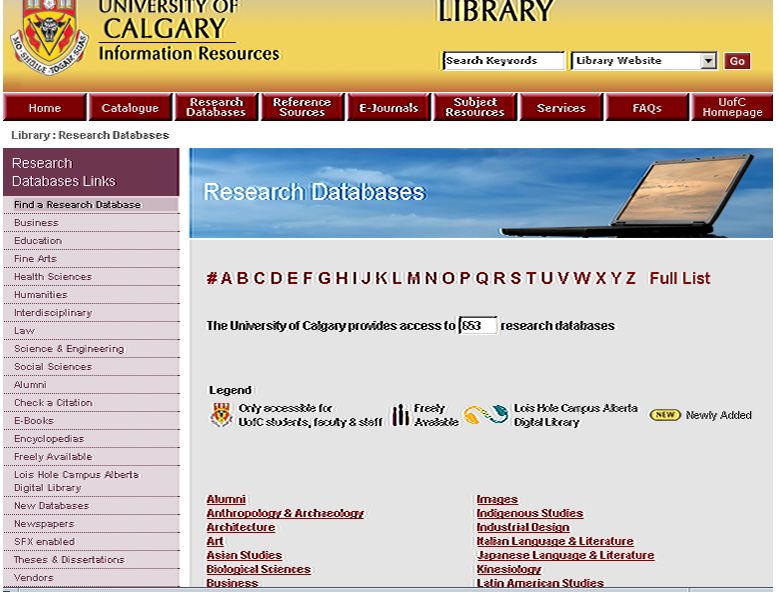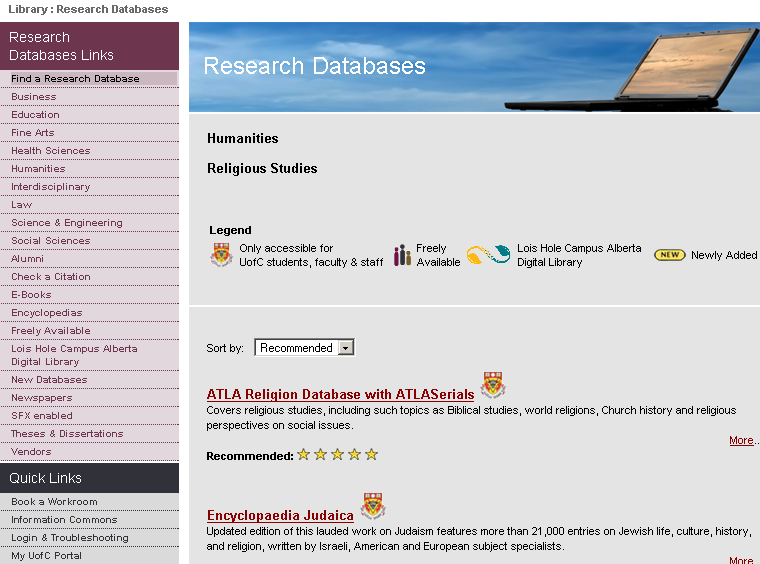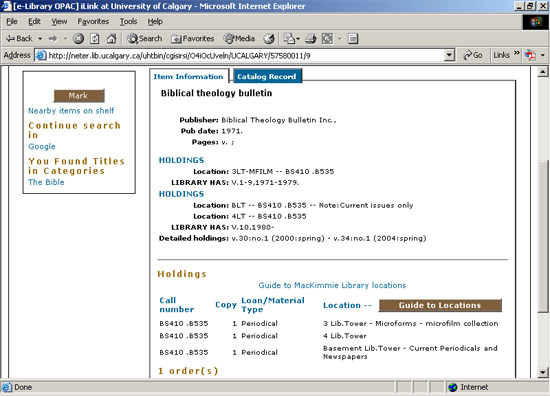| UNIT DESCRIPTION |
| PERIODICALS |
| LOCATING ARTICLES |
| ATLA RELIGION DATABASE |
| REFERENCE LIST |
LOCATING ARTICLES
- What is an Article Index?
- Vendors
- Using Article Indexes
- Full-Text Articles
- Help
- Review Quiz 1
- Understanding Citations
- Review Quiz 2
- Periodical Records
- Review Quiz 3
- Document Delivery for Articles
- Review Quiz 4
What is an Article Index?
The easiest and most efficient way to find articles on your subject is to use article indexes. Article indexes are databases of articles that often share a particular subject focus. An article index will help you find articles that are relevant for your research and give you the information to locate them. As with all databases, the content and fields of an article index are set by the database producers. Many of the search skills learned in the last unit are also important for effectively searching article indexes.
Vendors
Article indexes need an interface (program) that allows you to search their database. These interfaces are often run by commercial vendors. For example, the ATLA Religion Database is accessed through Ebscohost. ATLA Religion Database is the database itself while Ebscohost is the interface that lets you access it. Other examples of vendors are ABC-Clio, Webspirs, and WilsonWeb. Knowing how to use a particular interface means you will know how to access all the databases run through that database provider. For instance, a good understanding of how to use the Ebscohost interface will help you to efficiently search, Academic Source Premier, ATLA Religion Database, Index to Jewish Periodicals, Newspaper Source, and Sociological Collection, to name a few.
Using Article Indexes
To use an article index, you need to know what you are looking for. Check your topic and ask yourself:
- What general subject does your topic fall under?
- What specific areas apply to your topic?
- What are my keywords for searching?
The answers to these questions will help you make effective choices when selecting an article index - the first step in finding periodicals. Remember, as always, to stay flexible. Keep aware of alternative keywords and alternative spellings, e.g. Truncation (Unit 2)
Once you know what areas you want to search, go to the Research Database list on the Library Web site. The easiest way to find this it is to click Research Databases in the black bar at the top of the library home page. You will then see this screen:

To select an index, find the appropriate subject area (use broad subject categories on left hand menu bar to navigate to specific subjects.
Once you are familiar with the different article indexes, you can select them directly through the alphabetical list at the top of the Research Databases page.
Keep in mind that other subject areas may be useful to you. Doing a paper in religious studies doesn’t mean you need only use religious studies indexes. If you are doing a paper on Buddhism, try Asian Studies and perhaps even Chinese Language & Literature and Japanese Language & Literature. If you are doing a study of Christianity during the Middle Ages look at History and for a paper on women and religion check Women's Studies. For current events, use the newspaper indexes. Keep in mind the different ways of approaching your topic and ask yourself which disciplines it overlaps. Other subject areas that might be useful depending on your topic are:
- Philosophy
- Art
- Medicine
- Law
- Anthropology
- and many others...
If you select Humanities and then Religious Studies indexes, this is the beginning of the list that you will see:

The next step is choosing an actual index appropriate to your research. Remember your specific subject area and then evaluate the index based on the information in the middle column (Subjects covered). Ask yourself:
- Is it a general index or a subject focused one?
For instance, Humanities Abstracts is a broad index, covering archaeology, classical studies, fine arts, literature and religious studies among many others, while the ATLA Religion Database is more focused on topics for religious studies and Index Islamicus is very focused on Islam and the Muslim world. However, all of these indexes could be useful for your research, depending on your topic.- What subjects are covered? Does it cover your time period?
Once you have decided whether an index is general or subject focused, you need to be aware of the subjects and time periods it covers. If you are doing a paper on the Jesus Movement then the New Testament database would be much more useful than the Index Islamicus. Historical Abstracts can be very useful for religious history, but it only covers history back to 1450.- Does it have retrospective coverage of material or does it cover only works published in the last few decades?
It is important to note from what time frame articles are available. Sometimes your research will need only the most up-to-date material while at other times you will want more historical coverage of a topic.- Does the index offer full-text articles?
Some databases offer full-text articles while some are full-text only or allow you to limit to full-text. This can be very handy when you need to find an article in a hurry, but make sure you do not depend on full-text articles only!Once you have answered these questions and chosen an index, click on the title to access the index. If you cannot connect directly, it will explain where to access the index instead.
|
Evaluating your index isn't over yet! There are many more qualities and characteristics you can learn about an index once you have selected it and once you are already using it. When you are in the index, keep in mind the following questions:
- What sorts of subject headings do the articles have?
Some indexes only have one subject heading per article while others have multiple subject headings allowing for easier subject searches. Also, some indexes assign subject headings that are too general to be very useful while others use more specific subject headings.- How much information does the index provide?
Some indexes provide only the citation of a source to allow you to find it, while others include descriptive abstracts such as the Philosopher’s Index and Historical Abstracts.- What types of formats are included?
ATLA Religion Database indexes journal articles, books, essays, and reviews, while Academic Search Premier indexes journal articles, US Supreme Court cases, newspapers, books and images. Be aware of what types of material the index includes and make sure it is the type of material you need.As you become familiar with the different indexes you will become more and more proficient at selecting the ones that suit your needs, however, don't be reluctant to try new ones as well. If there are a few indexes you find yourself using regularly, it is worth your time to figure out their different features in order to use them most effectively. A few indexes useful for religious studies will be covered later in this unit.
Help
If you are having trouble finding articles on your topic:
- Read help screens
- Ask at the reference desk
- Contact your liaison librarian
N.B. Never assume that 0 results in a search means there is nothing on your topic.
Review Quiz 1
What three article indexes would be best to use for a paper on religious fundamentalism and why?
Click here to take the quiz.
Understanding Citations
Once you have run a search and gathered results, you have to know how to interpret them. If you were researching the Jesus Movement, you might find the following records:
"Recruitment to the Jesus Movement in Social-Scientific Perspective." Dennis Duling. Social Scientific Models for Interpreting the Bible. 132-175. Leiden; Boston: Brill, 2001.
"The Jesus Movement and Social Network Analysis (Part II: The Social Network) Dennis Duling. Biblical Theology Bulletin. 30:1 Spr 2000. 3-14.
These are citations. They contain enough information, such as title, author and source, in order for you to find the article. Some of the articles will have full-text links allowing you to connect to them directly from your computer; for others, you will have to look them up in the Library Catalogue.
When searching the Library Catalogue, it is necessary to look for the source of the item rather than the item itself. For example, if you were looking for "Recruitment to the Jesus Movement in Social Scientific Perspective" you would have to identify its source as a book titled Social Scientific Models for Interpreting the Bible. You can tell it is a book as the publication information includes a location and a publishing company. "The Jesus Movement and Social Network Analysis (Part II: The Social Network)" is an article in a journal called Biblical Theology Bulletin. The volume and issue number (30:1) are clear clues that this is a journal article. For the first article, you would search the catalogue for the book and for the second article you would search for the journal.
When searching the Library catalogue for journals, use the journal title as your search term, select browse and then limit your search to the journal title field.
Review Quiz 2
If you found the following record which of the searches (1-5) would be best for finding it in the library catalogue?
Covenantal Hermeneutics and the Redemption of Theory. Davies, Lloyd. Christianity and Literature, 46 Spr-Sum 1997, p 357-397.
- "Covenantal Hermeneutics and the Redemption of Theory" as periodical title
- "Christianity and Literature" as periodical title
- "Covenantal Hermeneutics and the Redemption of Theory" as title
- "Lloyd Davies" as author
How about this one?
Biblical Scholarship: When Tradition Met Method. McDonald, Patricia M. Catholic Church in the Twentieth Century, p 113-130. Collegeville, Minn: Liturgical Press, 2000.
- "Biblical Scholarship: When Tradition Met Method" as periodical title
- "Biblical Scholarship: When Tradition Met Method" as title
- "Catholic Church in the Twentieth Century" as title
- "Patricia M. McDonald" as author
Click here to take the quiz.
Periodical Records
Interpreting whether the library has a particular issue of a periodical is trickier than deciding whether or not it has a book. For your second source, you have found Biblical Theology Bulletin and want to know if we have volume 30. To see our holdings look for the words "Library Has". Note that we can have holdings in different locations and/or different formats. It should look like this:

Looking at this you can see that the Library has volumes one to nine on microfilm and then all volumes from ten to the present in paper. The most current issues of all periodicals are kept in the basement of the Library Tower (BLT). Back issues of this journal are on the fourth floor of the Library Tower (4LT). Again, remember that if the Library does not have the journal or the volume of the journal that you need you can order it through Document Delivery, if you have left yourself enough time. (Normally need at least a week for journal articles and two weeks to a month for books).
Note if you select Catalog Record you will get further information on the journal including recently arrived issues, place of publication, information on title changes and subject headings assigned to this item.
Review Quiz 3
Does the Library have "Health and Healing in the Qur’an" by Ahmed Elkadi. You know it is in the American Journal of Islamic Social Sciences, Volume 2, Issue 2, December 1985 and pages 291-296.
How about "The Islamization of Knowledge: Yesterday and Today" by Taha Jabir Alwani, in the same journal but Volume 12, Spring 1995, pages 81-101?
Click here to take the quiz.
Interlibrary Loan for Articles
If the Library does not have a particular journal that you are looking for, you can order it through document delivery. On the main library page, select Interlibrary loan (listed under Library Services). Then select Requesting Interlibrary Loans from the list on the left, select Request an Interlibrary Loan and select online request form. Enter your user ID and PIN number to access this service (instructions are available on the Web page). Select what type of document you want to order (book, conference proceeding, journal, thesis). Fill out the form and send it - your document should arrive shortly.
N.B. Make sure you have read and agree with the Interlibrary Loan policy (you can connect to it from a link on the order form). There are no charges for this service.
Review Quiz 4
Click on the following to take some quizzes on MLA Citation Style.
Click here to continue to the next section